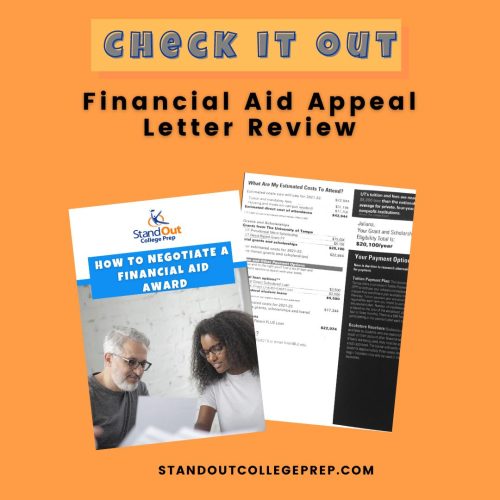If you’re a high school senior who is worried about paying for college, financial aid can be a true lifesaver. Once you’ve received your acceptance letter, financial aid packages should arrive in the following weeks. However, if you still haven’t received your package by then, don’t hesitate to contact the financial aid office for assistance. Once your award letter arrives, it’s important to sit down with your family to determine if the college is truly affordable for you. Unfortunately, sometimes the financial aid package you receive may not cover all of your expenses. In these cases, writing a letter of appeal for additional financial aid can be a helpful option.
In this blog post, we’ll provide some tips to ensure that you learn how to write a letter of appeal for financial aid and make your appeal as effective as possible.

Table of Contents

How to write a letter of appeal for financial aid
Here are the do’s and don’ts to make your letter of appeal for financial aid as effectives as possible.
Dos:
Do express gratitude and appreciation for any assistance received.
When writing a letter of appeal for financial aid, it’s important to express gratitude and appreciation for any assistance you have already received. This shows that you are not taking the aid for granted and that you understand the value of the support you have been given. It also helps to build a positive relationship with the financial aid office, which can be beneficial in the future if you need to appeal again. Be sincere in your expression of gratitude, and avoid using overly formal or generic language.
Here’s what the beginning of your letter may say:
“I hope this letter finds you well. I am writing to express my gratitude for the financial aid package awarded by the University of Tampa.”
“I am deeply appreciative of the financial support I have been granted thus far, as it has allowed me to pursue my educational goals at Miami University of Ohio.”
“I am profoundly grateful for the $20,000 financial aid package I have received thus far, as it has enabled me to pursue my educational aspirations at the University of Chicago.”
Do provide specific reasons for your appeal.
In your appeal letter, kindly ask the financial aid office to take another look at your financial aid package, considering your current situation. Explain that extra help, like grants, scholarships, or work-study programs, would make a big difference in helping you continue your education at the school. When explaining why you need more support, mention specific reasons such as sudden costs, changes in your money situation, or other special circumstances. Providing this new information can help the financial aid office better understand your current situation and may increase your chances of receiving additional aid. Give plenty of details and be sure to provide documentation to support any claims you make.
Highlight commitment to your education
Make sure to highlight how committed you are to doing well in school and being a positive part of the college community. Talk about your dreams and what you hope to achieve in the future. By sharing these things, you show that giving you more financial help would be a great investment because you’re going to make the most of it and have a successful future.
Here are examples that may be helpful as you draft your letter:
"I am wholeheartedly committed to my academic journey and eager to make a positive impact on the college community through my involvement in clubs, volunteering, and supporting my fellow students."
"As I strive towards my goal of becoming a [desired profession], I am determined to excel academically and take full advantage of the educational opportunities provided at the University of Michigan to prepare for a successful career."
"I am deeply grateful for the financial assistance I have received thus far, and with your continued support, I am confident that I will be able to achieve my educational goals and contribute meaningfully to both the college community and society as a whole."
Provide supporting documentation
Attach any relevant documentation that supports your appeal, such as proof of income, medical bills, or a detailed explanation of your family’s financial situation. This will help the financial aid office make an informed decision about your request for additional support. Here’s a list of common types of supporting documentation you may need to include in your appeal:
- Letter of explanation: A written statement that outlines your family’s financial situation, any recent changes, and the reasons for requesting additional financial aid.
- Proof of income: Documents that verify your family’s income, such as recent pay stubs, W-2 forms, or tax returns.
- Proof of unemployment or job loss: If applicable, provide documentation such as an unemployment benefits statement or a termination letter from your former employer.
- Medical bills: Copies of medical bills or invoices for any significant medical expenses not covered by insurance, especially if these expenses have affected your family’s ability to contribute to your education.
- Death certificate or obituary: If your family has experienced a recent loss that has impacted your financial situation, provide a copy of the death certificate or obituary as evidence.
- Proof of reduced income: If your family’s income has decreased due to factors such as reduced work hours or a pay cut, provide documentation that demonstrates this change.
- Divorce or separation documents: If your parents are divorced or separated, provide legal documentation that outlines the financial arrangements and any changes in support that may affect your ability to pay for college.
- Proof of one-time or unexpected expenses: If your family has incurred a significant one-time expense, such as a natural disaster or a major home repair, provide documentation that verifies these costs.
- Letters of support: Letters from teachers, guidance counselors, or community leaders that attest to your academic achievements, character, and commitment to your education can strengthen your appeal.
- Financial aid award letters from other institutions: If you’ve received financial aid offers from other colleges or universities, include copies of these award letters to demonstrate your financial need and to show that other institutions have recognized your merit.
Be courteous and professional
Throughout your appeal letter, maintain a respectful and professional tone. Remember that the financial aid office is working to support students, and your request is one of many they will be considering. Being polite and understanding can go a long way in making a positive impression.

Don’ts:
Don't be confrontational
Avoid using a confrontational tone, and don’t threaten or give ultimatums. Avoid saying things like, “If I don’t get more aid, I can’t attend this school,” or “I’ll have to drop out if you don’t help me.” This kind of language can sound confrontational and may not work in your favor. Instead, offer solutions, such as suggesting other ways the school can help you, like offering a work-study program or connecting you with scholarships you might qualify for.
Don't make excuses or blame others
When writing a letter of appeal for financial aid, it’s important to take responsibility for your own financial situation. Avoid making excuses or blaming others for your financial struggles. Instead, focus on the specific circumstances that have led to your need for additional assistance and provide evidence to support your claims. Taking ownership of your situation will show the financial aid office that you are serious about finding a solution and willing to work hard to achieve your goals.
Don't provide irrelevant information
Stick to the facts and only provide information that is relevant to your appeal.
Don't exaggerate or lie about your situation
It may be tempting to exaggerate or even lie about your financial situation in hopes of receiving more aid, but this is not a good idea. Financial aid offices have processes in place to verify the information you provide, and if they discover that you have been dishonest, it could result in serious consequences, including the loss of all financial aid. Stick to the facts and provide documentation to support your claims. Honesty is always the best policy when it comes to appealing for financial aid.
Don't wait too long
Submit your appeal letter as soon as possible, as financial aid funds may be limited and awarded on a first-come, first-served basis.

Financial Aid Letter Appeal FAQs
When it comes to financial aid letter appeals, students and their families may have many questions about the process. Here are some frequently asked questions (FAQs) and their answers to help you better understand the appeal process.
What is a financial aid appeal letter?
A financial aid appeal letter is a written request to a college or university’s financial aid office, asking for a reevaluation of your financial aid package. This usually happens when the initial aid offer doesn’t cover your educational expenses or there’s been a significant change in your financial situation.
When should I submit a financial aid appeal letter?
Ideally, you should submit your appeal letter as soon as possible after receiving your financial aid offer or experiencing a change in your financial circumstances. The sooner you submit your appeal, the better your chances of receiving additional aid, as some funding sources may be limited.
What should I include in my financial aid appeal letter?
Your appeal letter should include the following:
- A clear expression of gratitude for the financial aid you have already received
- A detailed explanation of your family’s financial situation, including any changes or special circumstances that affect your ability to pay for college
- A polite request for a reevaluation of your financial aid package
- An emphasis on your dedication to your education and your desire to contribute positively to the college community
- Supporting documentation that verifies your financial situation and any special circumstances
What are some examples of special circumstances?
Special circumstances can include job loss, reduced work hours, medical expenses, divorce or separation, death of a parent or guardian, natural disasters, one-time expenses, caring for an elderly family member, or having multiple children in college at the same time.
What tone should I use in my appeal letter?
Use a respectful, friendly, and professional tone in your appeal letter. Avoid sounding confrontational or demanding. Focus on expressing gratitude for the aid you’ve received, explaining your situation, and requesting a reevaluation of your financial aid package.
How long should my financial aid appeal letter be?
Your appeal letter should be concise and to the point, usually no longer than one page. Make sure to provide sufficient details about your financial situation and special circumstances, but keep your explanations clear and straightforward.
When can I expect a response to my appeal?
The response time for a financial aid appeal varies depending on the institution and their workload. Generally, it may take anywhere from a few weeks to a couple of months. Be patient and follow up with the financial aid office if you haven’t heard back within a reasonable amount of time.
What are my options if my appeal is denied?
If your appeal is denied, you can consider applying for additional scholarships, seeking out work-study opportunities, taking out student loans, or exploring other funding sources, such as community organizations or employers that offer educational assistance programs.
Conclusion + Next Steps
A financial aid appeal letter is an important way to get extra help to make your college dreams come true. Now that you know how to write an appeal letter for financial aid, use these tips and tricks to boost your chances of getting more financial aid offers. If you need more help with writing your letter, don’t forget to check out our appeal letter writing service.







